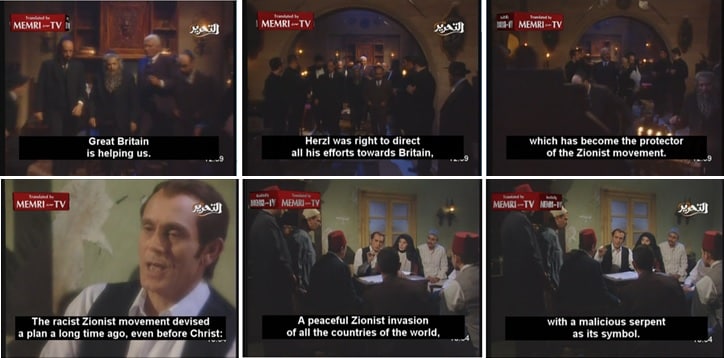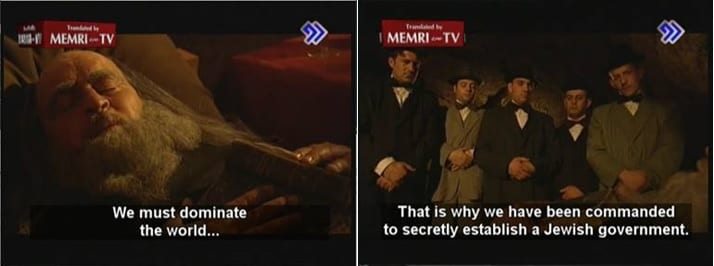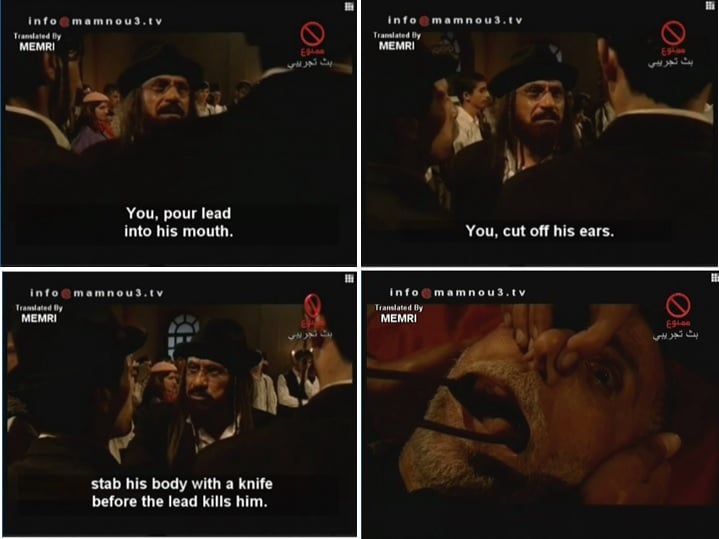"The Jewish people have seen, over the years and over the centuries, that hate prepares the way for violence. The refusal to expose and confront intolerance can lead to crimes beyond imagining. So we have a duty to expose and confront anti-Semitism, wherever it is found." – President George W. Bush, May 18, 2004, Washington, DC, as printed in the 2008 Contemporary Global Anti-Semitism Report released in March 2008 by the Office of the Special Envoy.
Last month, it was reported that President Trump's first budget may eliminate both the State Department position of the Special Envoy to Monitor and Combat Anti-Semitism, as well as the Office to Monitor and Combat Anti-Semitism itself. On March 15, 2017, the budget was released, and it includes an $18 billion (29%) cut to the State Department. So far no additional information has been released about whether the position, or the Office, will be among those cut, but there is speculation that they will remain vacant.
2004: Office To Monitor And Combat Anti-Semitism Created
The Office was created by the Global Anti-Semitism Review Act of 2004 (H.R. 4230), in which MEMRI played a role. This Act, which requires "inclusion in annual Department of State reports of information concerning acts of anti-Semitism around the world," i.e. the Country Reports on Human Rights Practices and the International Religious Freedom Report, was introduced by the late legendary Democratic Congressman Tom Lantos, the only Holocaust survivor to serve in Congress. It was aimed at helping curb the alarming increase in hate crimes against Jews and Jewish institutions worldwide. Under it, there would be "a permanent office in the Department of State to monitor and combat anti-Semitism" and "the Department of State should thoroughly document acts of anti-Semitism and anti-Semitic incitement" worldwide. This new Office would be responsible for "monitoring and combatting acts of anti-Semitism and anti-Semitic incitement that occur in foreign countries" and provide "[a]n assessment and description of the nature and extent of acts of anti-Semitism and anti-Semitic incitement that occur in foreign countries, including descriptions of... propaganda in government and non-government media and other sources in foreign countries that attempt to justify or promote racial hatred or incite acts of violence against Jewish people [and] the actions, if any, taken by the governments of such countries to respond to such violence and attacks or to eliminate such propaganda or incitement."
Signed by President Bush in October 2004, the Act referred to MEMRI research multiple times, including on government distribution of anti-Semitic books, among them those dealing with Jewish conspiracies and The Protocols of the Elders of Zion. The Act cited several examples, included below; of the type of material collected by the office, and the envoy would use it to criticize regimes, with these examples as proof in hand.
Example From Egyptian Anti-Semitic Series "Horseman Without A Horse" Cited in Act
The Act stated: "In November 2002, state-run television in Egypt broadcast the anti-Semitic series entitled 'Horseman Without a Horse,' which is based upon the fictitious conspiracy theory known as the Protocols of the Elders of Zion. The Protocols have been used throughout the last century by despots such as Adolf Hitler to justify violence against Jews."

To view this video from the MEMRI TV archives, click here or below:
Another Example From The Act: "Al-Shatat" Syrian Series Shows Jews Conspiring To Gain Control Of The World
The Act stated: "In November 2003, Arab television featured an anti-Semitic series entitled 'Ash-Shatat' ('The Diaspora'), which depicts Jewish people conspiring to gain control of the world."

To view this video from the MEMRI TV archives, click here or below:

To view this video from the MEMRI TV archives, click here or below:
2006: Position Of Special Envoy Created
The position of the Special Envoy was created in 2006, following Rep. Lantos's passing. As noted, the Act requires "inclusion in annual Department of State reports of information concerning acts of anti-Semitism around the world," i.e. the Country Reports on Human Rights Practices and the International Religious Freedom Report. In documenting anti-Semitism, the State Department's Special Envoy to Monitor and Combat Anti-Semitism have used MEMRI research and translations to directly approach officials from Egypt, Saudi Arabia, and other countries and question them about anti-Semitic statements by their countries' representatives or disseminated by their countries' media. While the information on anti-Semitic incidents included in these reports are the types of information that the envoys have used in these meetings, it is not the envoys who select the examples to be included.
MEMRI Has Worked With All Three Special Envoys To Monitor And Combat Anti-Semitism – And The Envoys' Support For The Fight Against Anti-Semitism Is One Area Where Democrats And Republicans Agree
For almost two decades, MEMRI has assisted the State Department in many areas, including the fight against anti-Semitism in the Arab world, Iran, South Asia, and other parts of the Muslim world. In August 2011, MEMRI received a $200,000 U.S. State Department grant to help expand and enhance the department's documentation and reports on anti-Semitism in the Arab and Muslim world.
MEMRI has worked with and assisted all three Special Envoys – Gregg Rickman (2006-2009), Hannah Rosenthal (2009-2012) and Ira Forman (2013-2017) – and can attest that their work has in no way been anything less than thorough, essential, or vital. Each of them necessarily operated under the political constraints of the administrations that they served.
The Special Envoys, who have been appointed by both Democrat and Republican administrations, have also participated in annual MEMRI events that highlight that year's most significant antisemitic content from Arab and Iranian media. Before MEMRI launched these annual events, Envoy Gregg Rickman spoke at an earlier MEMRI Capitol Hill event – a May 1, 2007 briefing on Holocaust denial in the Middle East and the Muslim world that was hosted by Reps. Steven Rothman and Eric Cantor.
In the Contemporary Global Anti-Semitism Report released in March 2008 by the Office of the Special Envoy, Rickman eloquently described what the mission of the new State Dept. office and envoy would be: "Anti-Semitism is one of the oldest forms of malicious intolerance and violates the precepts of human dignity and equality that are fundamental to a free and peaceful society. History has shown that wherever anti-Semitism has gone unchecked, the persecution of others has been present or not far behind. Defeating anti-Semitism must be a cause of great importance not only for Jews, but for all people who value humanity and justice and want to live in a more tolerant, peaceful world. Together, we must continue our efforts to monitor and combat anti-Semitism in all of its forms wherever and whenever it occurs."
The MEMRI Anti-Semitism and Holocaust Denial Documentation Project, which was renamed in memory of Rep. Lantos as The Tom Lantos Archives on Anti-Semitism and Holocaust Denial, includes an annual compilation from its own research, releasing them at its annual event in the Speaker's Dining Room at the Capitol, sponsored by the Speaker of the House. At these events, a video compilation of that year's MEMRI TV clips on anti-Semitism is also screened. Included among the supporters and participants of this annual event were prominent Senators and Representatives, from both sides of the aisle – then-Senator John Kerry (view video here); then-Senator Harry Reid (view video here); and then-Senator John McCain (view video here). It should be noted that this is one area in which both Democrat and Republican members of Congress can, and have, worked together. Vice President Joe Biden expressed his support, as did Secretary of State Hillary Clinton. Two Speakers of the House and one future Speaker have participated in these events – Nancy Pelosi (view video here; also see here and here), John Boehner (here, here, here, and here), and then-House of Representatives Budget Chairman Paul Ryan (view video here) – as have other prominent figures such as the late Nobel Prize laureate Elie Wiesel and United States Holocaust Memorial Museum director Sarah Bloomfield.
Envoy Hannah Rosenthal, in her speech at the third Lantos event on July 27, 2011, underlined how essential MEMRI research has been to her work, saying that she "cannot put into words how useful the materials you [MEMRI] produce are to the work I do as Special Envoy." She elaborated on this by saying: "I've had the opportunity and the honor in this great job of mine to meet with ministers of education, ministers of culture, of information. And I've focused on the Saudi textbooks. And I got the commitments and I will take them at their word right now, that the language that MEMRI exposes will be changed. That there will be training of teachers. I did not get the commitment from Jordan that the schools will include lessons on the Holocaust or that it even existed. The minister of education looked me in the eyes and said, 'But we don't teach that it didn't happen'... And everywhere I've gone, it's been because of the documentation, that I have thanks to MEMRI and to the Lantos Foundation that I'm able to show people the reality, the documents, the clips, the words, the quotes. So that people can't look me in the eye and say we have no antisemitism – never have, never will..." (view clip of her statements here; read transcript here).
At MEMRI's fifth Capitol Hill event, Envoy Ira Forman thanked MEMRI and said, "One-half of the job that I do is monitor anti-Semitism. The other half, of course, is combating [it]... The MEMRI material that we get on an ongoing basis and every year is vital to our work and is reflected in... the Human Rights Report, which we should see in February, and the International Religious Freedom Report." He continued: "In Europe today we see parliamentary parties with significant representation who are openly xenophobic, openly anti-Semitic; who talk about blood libel in parliament; who talk about The Protocols of the Elders of Zion – parties like Golden Dawn in Greece, Jobbik in Hungary; and – and this is the crucial piece – the street militia. When was the last time we saw that? [In] 1933, before the Nazis took over in Germany.
"Secondly, all across the world we see Der Stürmer‑like cartoons and material coming out in droves, dehumanizing the Jew oftentimes, [sometimes] other material dehumanizing others. Iran... is dedicated to destroying a country of six million Jews.... To fight antisemitism you need not just historical truth, you need other tools, but it's the beginning because if you can't accept what happened in the past, you can't fight what's happening now. And there's even foreign governments that we can take some hope from. We're not always happy with exactly what everything the French Republic does, but there is a recognition in my visits to Paris, unlike I've been told 10 or 12 years ago, of the depth of problems of antisemitism in France... In France this weekend... 17,000 people, anti-government... yelling out through the streets, 'Jews, France is not yours. Jews, France is not yours,' 2014. This is not 1933 or 1939." (To view the clip of Special Envoy Forman's address, click here; read transcript here.)
A Reinvigorated Office To Monitor And Combat Anti-Semitism Under President Trump Could Contribute Significantly To Global Fight Against Anti-Semitism – And MEMRI Can Help
It should be noted the Arab and Muslim world has an anti-Semitism problem that has spread to Muslim communities in the West. A large percentage of anti-Semitic incidents in Europe are carried out by individuals with Middle Eastern and North African origin, who as shown by the MEMRI Lantos Archives have been brought up being incited by anti-Semitic sermons, Arab satellite television, anti-Semitism in their schools, and the Arabic-language anti-Semitic content that is widespread on social media – and all of it has a religious element.
Over the past few years, translations by MEMRI have led to arrests, and expulsions, of anti-Semitic, and jihadi, sheikhs in Germany, Spain, Italy, Belgium, Denmark, Australia, and elsewhere in the West. It is these kinds of incidents that the Office should be focusing on. This month, investigations were initiated against a sheikh in Montreal who in his December 23, 2016 sermon called for Jews to be killed. This was not the first such incident at a Montreal mosque; another imam included anti-Semitic content in several sermons in November 2014.
It should be noted that MEMRI research from its project on Antisemitism and Holocaust Denial has also been used to have television channels belonging to U.S.-designated terrorist groups Hamas and Hizbullah removed from satellite providers, along with Egyptian and Saudi channels that were disseminating anti-Semitic content.
The Office to Monitor and Combat Anti-Semitism and its Special Envoy are more necessary than ever. Nearly every day, MEMRI is continuing to document the extreme anti-Semitism in the Middle East that is tolerated there but is nearly ignored in the West. Under the Trump administration, there is a real opportunity for the office and position to be revitalized, and can really take off the gloves in challenging anti-Semitism much more directly. On February 2, 2017, incoming Secretary of State Rex Tillerson said in his welcome remarks to State Department employees: "As Secretary, I will deploy the talent and resources of the State Department in the most efficient ways possible. That may entail making some changes to how things are traditionally done in this department. Change for the sake of change can be counterproductive, and that will never be my approach. But we cannot sustain ineffective traditions over optimal outcomes."
Perhaps President Trump and those in his administration making the decision on whether to cut this office does not realize this, but a significant amount of the anti-Semitism that MEMRI has documented has jihad-supporting elements, and is directly connected to radical Islam. Thus, this MEMRI research can support one of this administration's main declared missions – fighting radical Islam. Keeping the Office to Monitor and Combat Anti-Semitism and its Special Envoy could also help this administration develop relationships with Arab and Muslim reformists who are speaking out against anti-Semitism and are natural allies of the U.S.
Keeping The Office To Monitor And Combat Antisemitism Will Prove President Trump's Commitment To Fighting Anti-Semitism
On February 21, 2017, President Trump said, in his remarks at the National Museum of African American History and Culture: "...We have to fight bigotry, intolerance and hatred in all of its very ugly forms. The anti-Semitic threats targeting our Jewish community and community centers are horrible and are painful, and a very sad reminder of the work that still must be done to root out hate and prejudice and evil."
On a daily basis, MEMRI is monitoring and translating Arabic, Farsi, Urdu, Pashtu, and Turkish anti-Semitic content from media in the region – work that no one else is doing. It is vital that the State Department continue to be aware of these sentiments in the region – and if MEMRI were not doing this work, very few would ever know about it. The funds were given to document anti-Semitism, Holocaust denial and Holocaust glorification in the Middle East.
President Trump's budget should not eliminate the Office to Monitor and Combat Anti-Semitism and its Special Envoy. They should be kept, and developed further. Doing so will also reassure the Jewish community of the President's commitment to fighting anti-Semitism and of his support for Jews in the U.S. and worldwide.
*Steven Stalinsky is Executive Director of MEMRI




